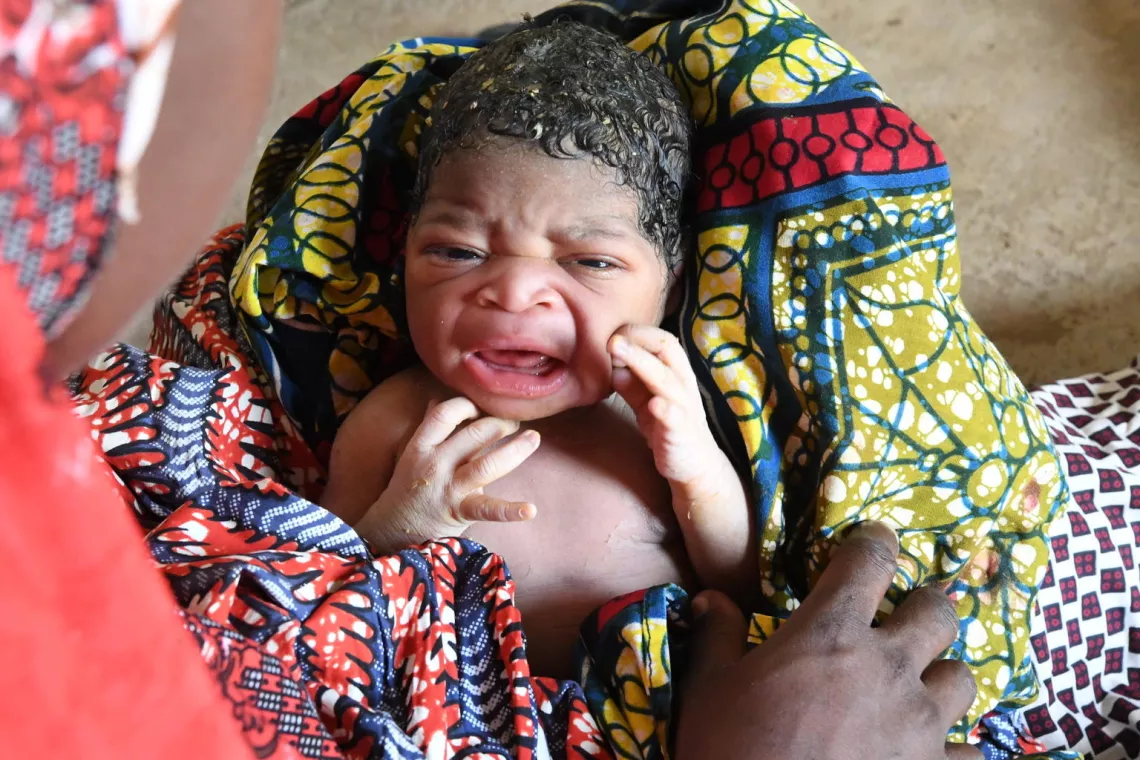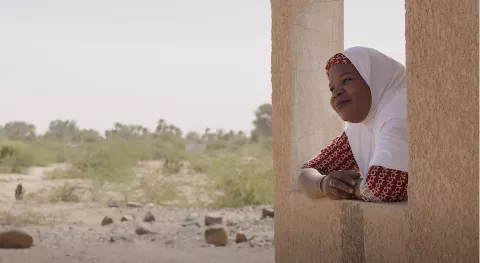Welcome to the world
A short video sequence of a baby born in Niger went viral on Instagram, reaching in a few days half a million views.

Rabi, a 32 years old woman gave birth to her seventh child in the health center of Zermou, in central Niger. The baby was born just one hour before the video was taken by our colleague Frank Dejongh, Multimedia Specialist, deployed in the field to document UNICEF programmes in Niger.
Posted on UNICEF Instagram account, the video has reached half a million views and recorded thousands of comments. “Welcome to the wonderful world baby. God bless you. I know your mom is so much thankful and very happy to have you in this world” comments Elsie Abella Galarpe.
Bring a life to the world ... will there be something bigger? After watching the video, we question ourselves what is like to be a baby born in Niger? Her mother, Rabi, hopes she will become a nurse.
Today, babies and young children in Niger are less likely to die from pneumonia, diarrhea, malaria, prematurity and other common childhood conditions than in the past. In 1990, 328 children under five died for every 1,000 born. That number dropped to 85 in 2017. Still: most of these deaths are preventable with the right childcare practices and access to timely medical attention.

In Niger, progress is slowed because less than half of all children and mothers live close to a health facility. Only 25 per cent of babies are breastfed in the first six months of life and a mere 20 per cent of young children sleep under an insecticide-treated bed net to prevent malaria.
Little progress has been made to reduce maternal mortality: 1 in every 187 women die during pregnancy, childbirth or after delivery. Less than one fifth of basic emergency maternal and neonatal care needs are covered, denying countless women and babies life-saving services.
No parents should experience the heartbreak of watching their child suffer or die. We can and must do better.
Although the country has made progress in reducing rate of under-five child mortality, newborn deaths have declined at a slower pace. A child’s birth and the 28 days that follow are the most dangerous period of her life. In Niger, more than 25 percent of all under-five children who died are newborns. These children are not dying because we don’t have the tools to save them. Most of all newborn deaths are caused by three preventable and treatable conditions: complications due to prematurity or during delivery, and infections like sepsis (38%), meningitis (7.1%), pneumonia (17.4%) and asphyxia (16.3%).
But treatment and interventions are not reaching the mothers and children who need them most – the families who live in the most disadvantaged areas, enduring the harshest conditions. In Niger, almost half of the population (51%) is found without access to essential care in 2016 and only four women in ten give birth with the help of qualified personnel.
UNICEF is using simple, inexpensive and high impact health interventions to improve the health of vulnerable children and women.

In Niger, UNICEF approach is to make children under five years of age and pregnant women, particularly the most vulnerable, increasingly benefit from quality high-impact interventions for the prevention and management of maternal and childhood illnesses, including in emergency situations, through:
- Empowerment of national and sub-national health authorities for government leadership and ownership towards provision of accessible and equitable quality maternal, newborn and child health services;
- Strengthening community platforms towards provision of accessible and equitable curative, preventive and promotional services for child health expanding the continuum of care from community to facility-based services; and
- Focus on high impact interventions for building and sustaining high quality health care for mothers and children.
Thanks to the financing of the Bill & Melinda Gates Foundation, the Possible Serious Bacterial Infections (PSBI) strategy was implemented in 4 districts of the Maradi region where the neonatal mortality rate is the highest in Niger (38/1000 live births). Thus, 80 providers of basic health facilities were trained in the management of potentially severe bacterial infection in young infants.
After only 4 months of implementation on the 4602 cases of PSBI expected for the year 2019, 2632 (57 %) cases were treated. Among the 2632 cases of PSBI received, 14 died, meaning a 0.5 % of case fatality rate; lower than the rate of 1.3% for the region in 2018 and 0.81% in the first half of 2019 for the whole region. It is important to underline that 83% of the PSBI cases were taken care of at the level of the integrated health centers and health centers. In the past 100% of the cases were referred to the level of the district hospital affecting the effectiveness of the service.
#ForEveryChild, the right to survive!




